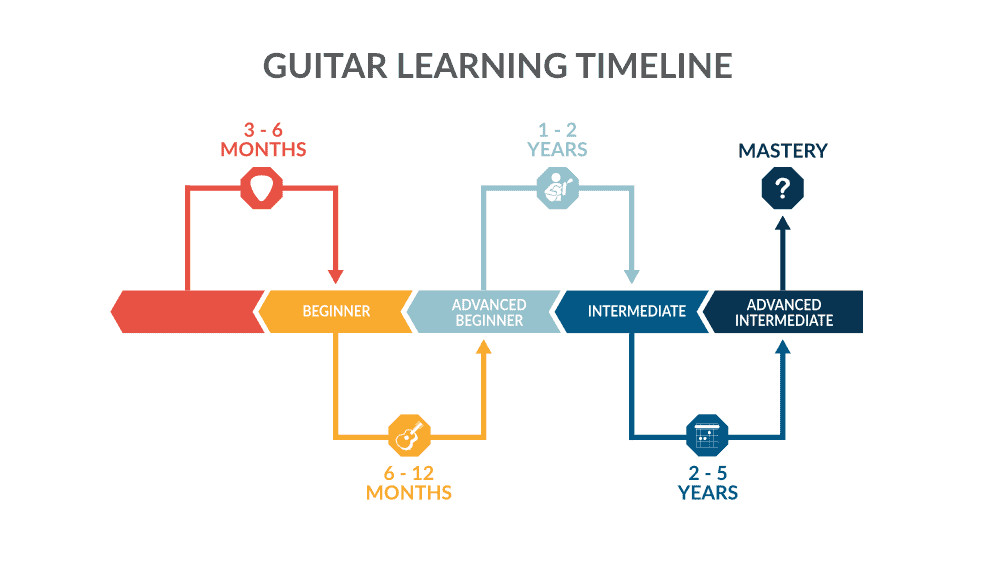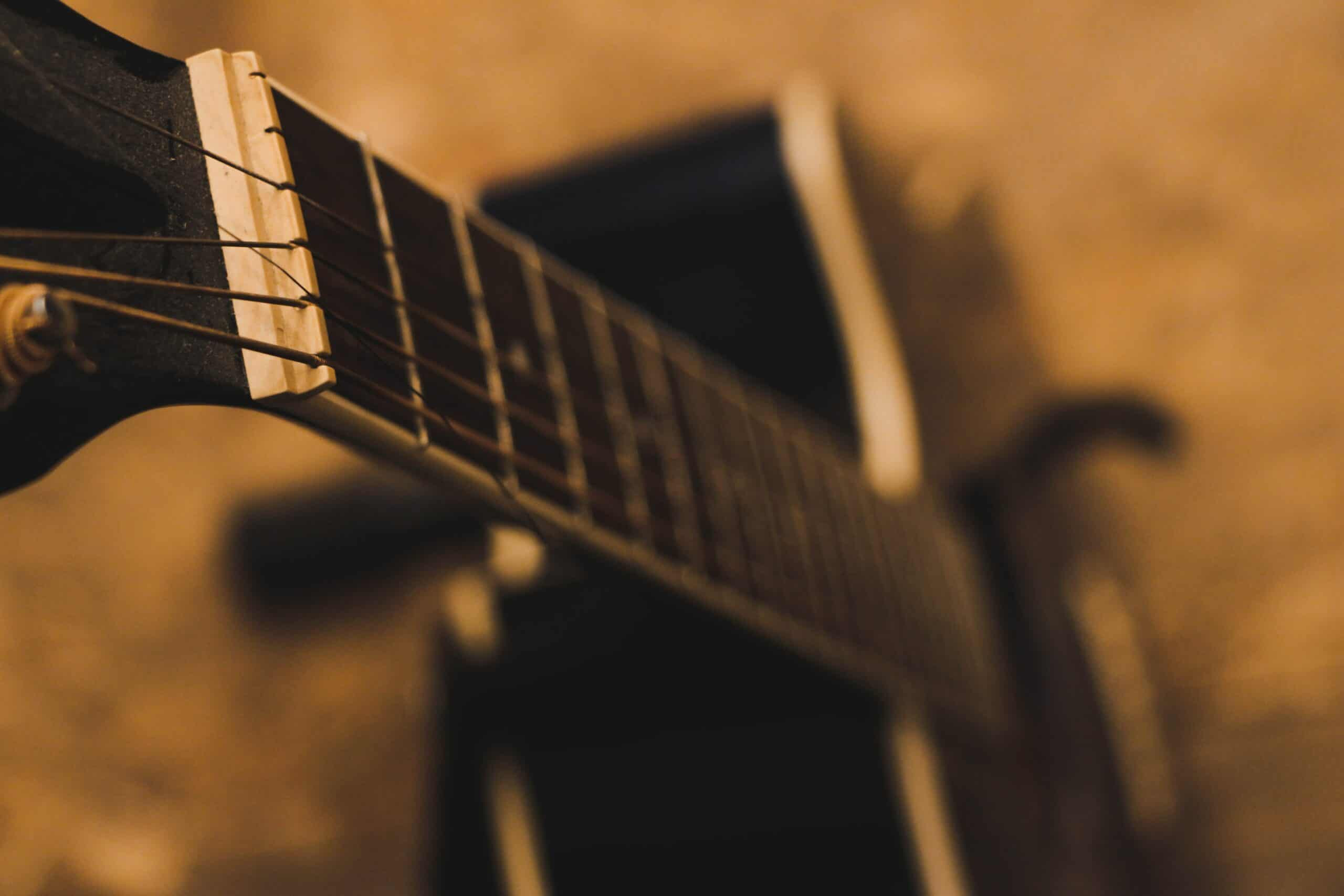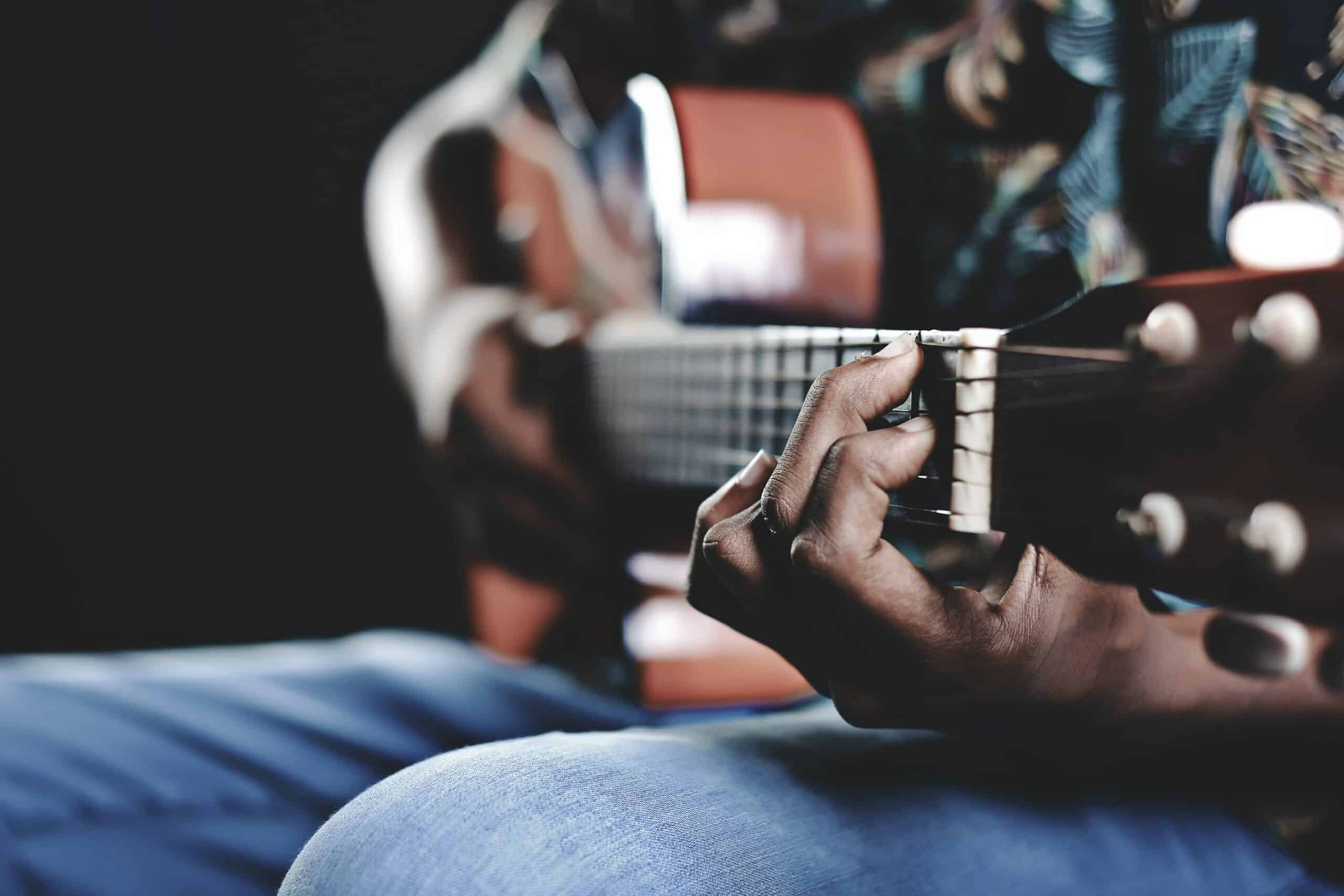Many aspiring guitarists start their musical journey with one burning question: “How long does it take to get good at guitar?” It’s a natural curiosity, fueled by the desire to know what lies ahead and whether the effort will be worthwhile. Understanding the guitar learning timeline can be incredibly helpful in setting realistic expectations and staying motivated.
The truth is, there’s no single, definitive answer. What “good” means varies greatly from person to person. One player’s good might be confidently strumming chords around a campfire, while another’s might be shredding complex solos on stage. Instead of a simple answer, let’s explore a realistic timeline, breaking down the different phases of learning guitar and what you can expect at each stage.
 Guitar Learning Timeline
Guitar Learning Timeline
Alternative text: Guitar learning timeline infographic showing beginner, advanced beginner, intermediate, and advanced intermediate phases with timeframes and skill descriptions.
It’s crucial to remember that everyone learns at their own pace. Factors like practice frequency, dedication, natural aptitude, and prior musical experience all play a role. Think of legendary guitarists like Eddie Van Halen, Jimi Hendrix, or Stevie Ray Vaughan – they all started as beginners, just like you. The journey is personal, and progress is about continuous improvement, not a race against time.
One of the first questions beginners often ask is, “When will I be able to play something recognizable?” The desire to play songs is a primary motivator for picking up the guitar. Here’s a practical look at a typical guitar learning timeline, divided into phases. Keep in mind that these are general guidelines, and your experience may vary.
Beginner Phase: 3-6 Months
In the initial 3 to 6 months, most students start to feel a sense of accomplishment. You’ll likely be able to play simple chords and strum basic songs. This is also the period where the initial excitement might meet the reality of the work involved. You’ll be developing calluses on your fingertips, building hand strength and coordination, and grasping fundamental techniques that are crucial for future progress.
This phase can be challenging. It’s common to encounter moments of frustration and even question if guitar is “too hard.” Unfortunately, many beginners lose momentum here. However, those who persevere and maintain a positive attitude are rewarded as they transition into the next phase.
Advanced Beginner Phase: 6 Months to 1 Year
After the initial burst of progress in the beginner phase, you might experience what feels like a slowdown. In the beginning, everything is new, and learning happens rapidly. You might see noticeable improvement almost daily. However, as you move beyond the first six months, your learning becomes more nuanced. You’re tackling more complex techniques, and your personal standards rise. This is often the first plateau in your guitar journey, but it certainly won’t be the last.
The initial novelty of learning guitar might diminish slightly. While progress might feel less dramatic, it’s still happening. The improvements are just smaller and more incremental than they were initially. This is another point where some students consider giving up. However, those who stick with it are poised for another significant leap forward in the intermediate phase.
Intermediate Phase: 1-2 Years
 Person playing electric guitar with focused expression.
Person playing electric guitar with focused expression.
Alternative text: A focused guitar player in a dimly lit setting, concentrating on playing an electric guitar, showcasing dedication in the intermediate learning phase.
The intermediate phase, often spanning from 1 to 2 years, can be described as the “buckling down” phase. It’s a time to put in consistent effort and refine your skills. Interestingly, it’s also at this stage that the initial question, “how long will it take to learn guitar,” starts to lose its relevance. If you’ve been practicing regularly, you’ve been steadily acquiring new skills and improving your playing without constantly fixating on the timeline. You may have been so focused on the next step that you haven’t fully appreciated how far you’ve already come.
By this point, you’ve likely mastered most or all open chords and even barre chords. Changing between chords becomes smoother and more fluid, and playing guitar begins to feel more comfortable and natural. You probably know several scales and can confidently play melodies. You also become acutely aware of the vastness of guitar knowledge and can identify specific areas where you want to improve.
Advanced Intermediate Phase: 2-5 Years
After 2 to 5 years of dedicated practice, you’ll reach the advanced intermediate stage. Everything you’ve learned up to this point becomes ingrained and second nature. Barre chords, once challenging, are now easy. Your strumming is polished, and you have a solid sense of rhythm. Your chord vocabulary expands with more complex and interesting chords. You’ve developed good technique and play with increasing confidence. You can likely play a wide range of songs from memory, and you might even be performing in a band.
If you’re interested in lead guitar, you might have started exploring improvisation. You probably have more musical ideas in your head than you can currently execute on the guitar. This can create a healthy tension, pushing you to improve and expand your abilities over time. You develop a clearer understanding of what you still need to learn and might decide to specialize in a specific genre like jazz, classical, blues, or rock.
A significant shift occurs in this phase. You move from a constant pursuit of new information to focusing on refining and deepening the skills you already possess. When you were a beginner, practicing might have felt like a chore. Now, you recognize the value of consistent practice to hone your foundational skills and elevate your playing. If you could travel back in time 2-5 years and hear yourself play now, you would likely consider yourself “good” at guitar. However, with your expanded knowledge and experience, “good” takes on a new, more nuanced meaning. You realize that learning guitar is an ongoing journey, a continuous process of growth and discovery, rather than just a means to an end. Playing and practicing the guitar become sources of joy in themselves, adding a rich dimension to your life that extends far beyond a simple hobby.
What Matters Most When Learning Guitar
 Person holding an acoustic guitar in a relaxed outdoor setting.
Person holding an acoustic guitar in a relaxed outdoor setting.
Alternative text: Relaxed guitar player sitting outdoors holding an acoustic guitar, emphasizing the enjoyment and personal journey of learning guitar.
As motivational speaker Tony Robbins wisely said, “The questions you ask guide your focus.” This principle is highly relevant to learning guitar. Asking “how long” can inadvertently shift your focus away from the very things that will help you become a better player.
Time itself is not a reliable indicator of progress. While the amount of time you practice undoubtedly influences your development, it doesn’t account for what you practice and how you practice. Instead of asking “how long will it take?”, try asking more actionable questions like “how can I improve my barre chords?” or “what’s a good daily practice routine?”. These questions are tangible, and you can directly measure your progress in addressing them.
The idea of being “good” at guitar can also lead to unhelpful comparisons with other guitarists or some arbitrary, external standard. While goals are valuable for motivation, comparisons can be detrimental. Focus on your own journey, celebrate your progress, and enjoy the process of learning.
Ultimately, the most rewarding aspect of learning guitar is the journey itself. Embrace the challenges, celebrate the milestones, and keep asking meaningful questions that guide you towards continuous improvement. What questions do you think will make you a better guitar player? Share your thoughts in the comments below!
If you’re looking for guidance on what to practice and how to structure your practice time, be sure to grab a free Guitar Success Checklist. By answering a few quick questions, you’ll receive a personalized report with recommendations on where to focus your practice for maximum impact.
